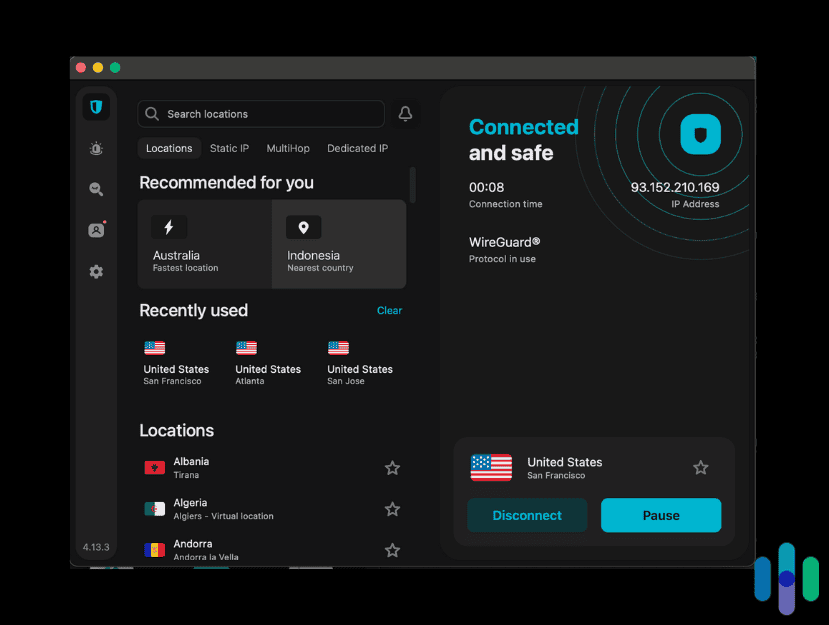AVG vs. Surfshark – Comparing Two VPNs With an Antivirus Option
For those looking to bundle a VPN and antivirus software, our tests have shown that Surfshark is a better choice than AVG.


 Aliza Vigderman, Senior Editor, Industry Analyst
&
Aliza Vigderman, Senior Editor, Industry Analyst
&
 Gabe Turner, Chief Editor
Last Updated on May 07, 2024
Gabe Turner, Chief Editor
Last Updated on May 07, 2024

- No-logs VPN company based in the Virgin Islands
- Allows unlimited connections, double VPN, and split tunneling
- Choice of OpenVPN, WireGuard, and IKEv2

- 60 day free trial
- Up to 10 devices covered
- Month price ranges from $4.39 to $4.49

If you’re only starting to build out your cybersecurity arsenal, it makes a lot of sense to choose a brand that offers both a VPN and antivirus software. That way, you only have to deal with one company and don’t have multiple bills to pay. AVG and Surfshark both fit the bill, but which option is better for you?
We know that both offer great antivirus software, as evidenced by the fact that they made our 2025 list of the best antivirus software. Let’s explore each brand’s VPN service. We tested each VPN for two weeks on a Windows laptop and a MacBook Pro. Here are our findings.
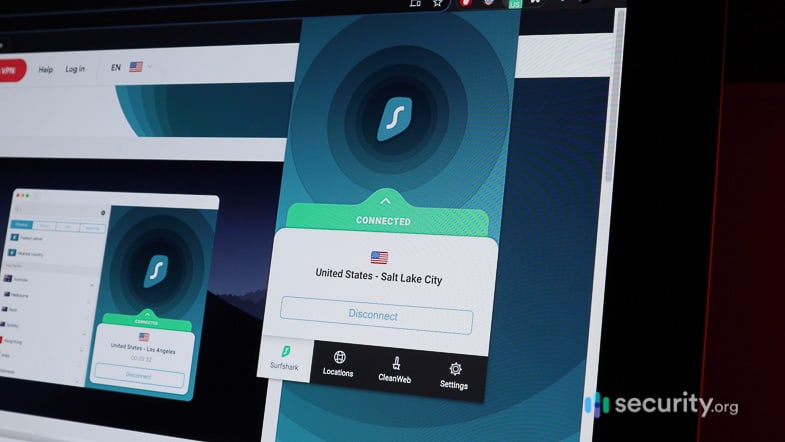
AVG vs. Surfshark: Server Network
Side by side, it’s clear that Surfshark has the advantage of having a larger network. We weren’t surprised to see that; After all, Surfshark first started as a VPN brand before it introduced its antivirus software. AVG, on the other hand, began as an antivirus company in the early 1990s. Only after it was acquired by Avast in 2016 did it start offering a VPN.
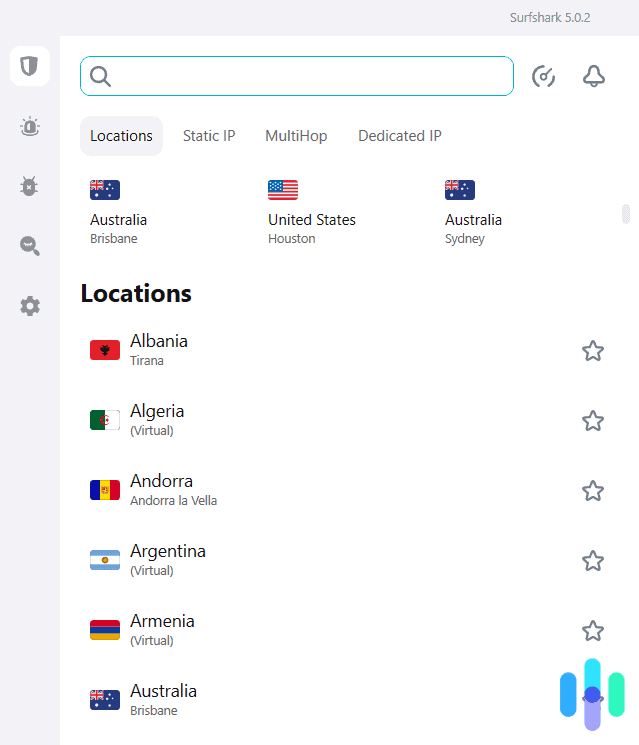
Here’s a quick comparison of AVG and Surfshark’s networks.
| Server network | AVG | Surfshark |
|---|---|---|
| Number of servers | 700+ | 3,200+ |
| Server locations | 37 countries | 100 countries |
A quick look at each VPN’s respective servers already helped us set our expectations. First of all, more servers often means better overall performance, since users have more options to connect to. Traffic is less likely to bottleneck. Also, having more server locations means users around the world can always find a nearby server. That’s largely why we chose Surfshark as one of the top VPNs for traveling and best streaming VPNs (for unlocking other countries’ streaming libraries).
Compare: Surfshark is among the VPNs we’ve tested that have the largest networks. Its 100 locations tied it with CyberGhost, and it’s outdone only by ExpressVPN (105 countries) and NordVPN (111 countries). See our Surfshark vs. NordVPN page to compare their performance. Or, take a look at our Surshark and ExpressVPN comparison page to see how it stacks up against the runner-up.
AVG vs. Surfshark: Speed
Of course, expectations and reality don’t always match up, so we still tested AVG and Surfshark’s performance.
To make sure we were being fair to each VPN, we didn’t just rely on raw internet speed readings. We performed three speed tests with each VPN using an Acer Aspire 5 laptop and averaged the results. After that, we performed three more speed tests without connecting to a VPN, which became the baseline reading we used to compare the VPNs’ speeds.
Our average baseline speed was 243 Mbps for downloads and 229 Mbps for uploads.
| Speed test results (PC) | AVG | Surfshark |
|---|---|---|
| Average download speed | 219 Mbps | 232 Mbps |
| Download speed loss | 9.88% | 4.53% |
| Average upload speed | 201 Mbps | 207 Mbps |
| Upload speed loss | 12.23% | 9.61% |
| Average latency | 102 ms | 75 ms |
Take-away: While faster than AVG, our Surfshark speed test results followed the same trend we saw from a VPN speed test study we conducted recently. Surfshark is capable of fast downloads, but the upload speed is usually much lower. In any case, Surfshark is one of the fastest VPNs for desktops and laptops.
We also performed the same test using a MacBook Pro running macOS 14 and got largely similar results. Our baseline speed on the MacBook was 247 Mbps for downloads and 239 Mbps for uploads.
| Speed test results (Mac) | AVG | Surfshark |
|---|---|---|
| Average download speed | 207 Mbps | 241 Mbps |
| Download speed loss | 16.19% | 2.43% |
| Average upload speed | 198 Mbps | 211 Mbps |
| Upload speed loss | 17.15% | 11.72% |
| Average latency | 88 ms | 72 ms |
Some VPNs perform differently depending on the device and operating system you’re using. For example, as we can see from the results above, AVG performed better on Windows than on macOS. Meanwhile, Surfshark’s download speed was a lot better on macOS.
Pro Tip: If you’re buying a VPN for either a Windows or a macOS device, check out our lists of the best VPNs for Windows and top VPNs for macOS. Surfshark made both roundups.
AVG vs. Surfshark: Privacy
Another important aspect to look into when comparing VPNs is how they deal with your privacy. Sure, VPNs keep your online activity private from your internet provider, hackers, websites, and the government, but what do they do with the data that passes through their networks?
Well, all the highest-rated VPNs we’ve tested have a no-logs clause in their privacy policy. That’s also true for AVG and Surfshark. But this is where things get a little bit tricky. Let’s quickly discuss each VPN’s privacy policy.
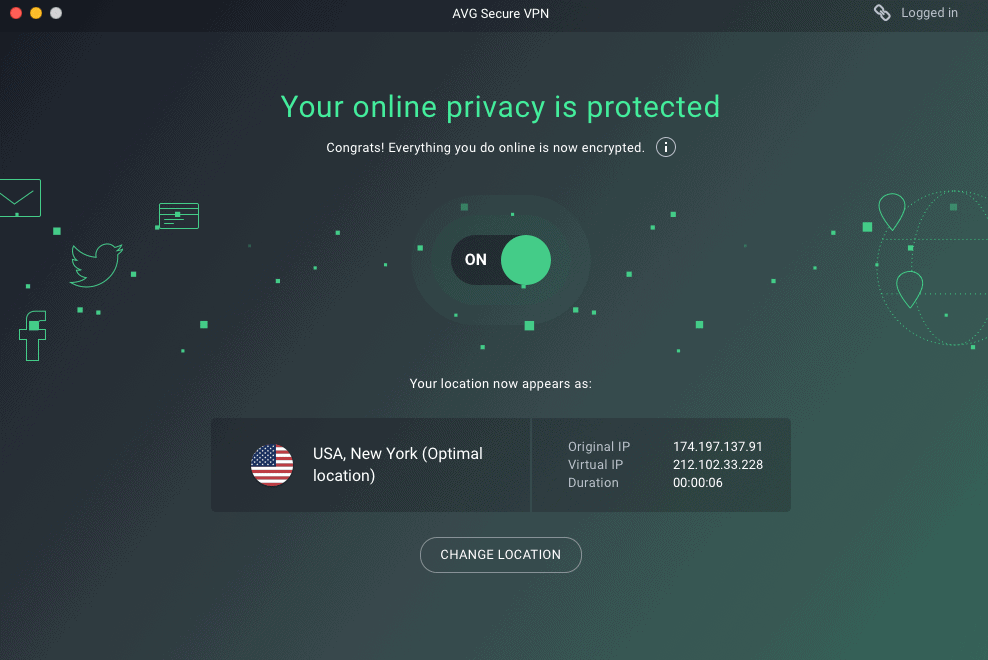
AVG Privacy Policy
AVG has a clear-cut privacy policy. It says that the company doesn’t store information like:
- Originating IP addresses
- DNS queries
- Browsing history
- Transferred data such as emails, pictures, files, etc.
However, AVG has never undergone a third-party independent audit of its privacy policy, so we have to take their word as truth.
To be fair, there haven’t been any issues with how AVG handles data, unlike some other VPNs out there (like IPVanish) that have been entangled in controversy. Despite having a no-logs policy, court records from 2016 seemed to show that IPVanish released information to law enforcement — information the company wasn’t supposed to be logging in the first place.1
As long as AVG can keep its name clear, we have more reason to trust its privacy policy than Surfshark. Here’s why.
FYI: IPVanish has cleaned up its act since the 2016 incident. You can see it’s current logging policy in our IPVanish review. The company even invited the Leviathan Security Group to evaluate its no-logs policy in 2022.
Surfshark Privacy Policy
Surfshark also has a no-logs policy, but it logs more than we think it should. More specifically, it keeps a record of users’ originating IP addresses. Here’s the full statement from Surfshark’s privacy policy:2
“Our servers do store information about your connection to a particular VPN server (user ID and/or IP address and connection time stamps), BUT this information is automatically deleted within 15 minutes after termination of your session. And be assured that no information is stored about the websites you visit.”
The originating IP address — the IP address of the device used to connect to Surfshark — is sensitive personally identifiable information. If leaked, it could reveal who used Surfshark and when they used it. It doesn’t reveal browsing history, but there’s still a lot someone can do just by knowing your IP address. Fortunately, Surfshark deletes that information 15 minutes after you end your VPN session.
>> Learn More: Securing Confidential Personal Data Both Online and Offline
But how can we be sure? Well, Surfshark has been audited numerous times by firms like Deloitte and Cure53 — two of the biggest consulting firms in the world. The latest audit report released in January 2024 shows that Surfshark is in full compliance with its no-logs policy.
Despite that, we still firmly believe that VPNs shouldn’t log originating IP addresses.
AVG vs. Surfshark: Features
Let’s shift our focus back to the VPNs themselves. While testing both VPNs, we saw an immense gap in the features they offer. We mentioned in our Surfshark review that it’s one of the most feature-rich VPNs we tested. It’s right up there with NordVPN, our overall favorite VPN. On the other hand, AVG’s VPN is one of the most straightforward we’ve seen. It encrypts your traffic when you connect to the VPN, but it doesn’t do much else.
Here’s a quick comparison of what they offer, and after that, we’ll talk about each of those features.
| Features | AVG | Surfshark |
|---|---|---|
| VPN protocols | OpenVPN | OpenVPN, WireGuard |
| Encryption | 256-bit AES | 256-bit AES (OpenVPN), ChaCha20 (WireGuard) |
| Kill switch | Yes | Yes |
| Multihop | No | Yes |
| Split tunneling | No | Yes |
VPN Protocols and Encryption
The VPN protocol dictates how traffic is networked from your device, to the VPN server, and back. It plays a huge role in a VPN’s performance and security. Besides a few VPNs that have created their own VPN protocols (see our ExpressVPN review, for example), most VPNs use open-source protocols like OpenVPN and WireGuard. Those two are precisely the options Surfshark offers. Meanwhile, AVG offers only OpenVPN.
- WireGuard: In our experience, WireGuard performs better. It was Surfshark’s default protocol, which is probably the reason it was faster than AVG. However, WireGuard doesn’t support our recommended 256-bit AES encryption and instead uses ChaCha20. That VPN encryption standard is more lightweight, but still about as secure as 256-bit AES.
- OpenVPN: OpenVPN has been around for almost two decades and is the most trusted option in terms of security. It supports 256-bit AES and is more thorough because it has over 10 times more lines of code than WireGuard. That said, our experience with OpenVPN has shown performance issues over long-distance traffic routing.
Since Surfshark let us choose between two VPN protocols, we picked it over AVG in this round.
Kill Switch
Out of all VPN features, the kill switch is the most important one in our opinion. It’s pretty straightforward; If your VPN suddenly disconnects, the kill switch stops all traffic. That keeps you from accidentally sending or receiving data over an unsecured connection. No VPN is 100-percent reliable, so the kill switch is a must-have fail-safe feature.
>> Learn About: How to Test Your VPN
Fortunately, both Surfshark and AVG have a kill switch. The main difference was that AVG’s kill switch was on by default, whereas we had to manually turn on Surfshark’s kill switch. It took less than five seconds to turn on the feature and once it was active, it stayed that way for the rest of our two-week testing phase. That said, for folks who don’t know much about this feature, it’s a bad move on Surfshark’s part to leave the kill switch off by default. AVG wins this round.
Pro Tip: Whichever VPN you end up with, always check that the kill switch is on after installing the VPN.
Multihop
Multihop isn’t as necessary as a kill switch, but it’s a nice feature to have in your arsenal. Between AVG and Surfshark, only Surfshark offers this feature. In fact, very few VPNs offer multihop, so we can’t blame AVG for not having it.
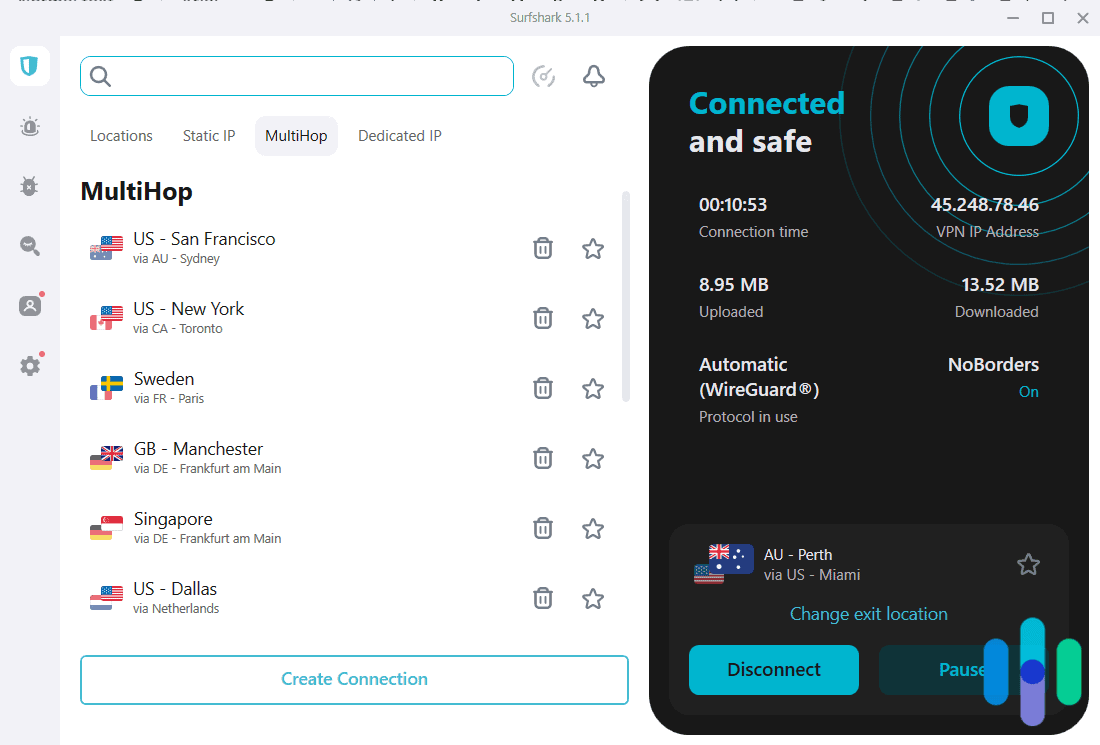
What is multihop, though? Think of it as a daisy chain for your VPN connection. From your device, traffic goes to a VPN server, and then to another VPN server in a different location. It has two purposes, both of which increase your online security and privacy:
- Double encryption: Data is encrypted every time it passes through a server, making it nearly impossible to crack if it’s intercepted.
- Concealing your real IP address: Even a normal VPN connection can hide your real IP address by using the VPN server’s IP address as your proxy to the internet. With multihop, two VPN servers will work together to hide your identity even better.
Surfshark wins this round not only because it has multihop, but because it has one of the best multihop setups of all the VPNs we tested. Multihopping can seriously slow down your internet. For best speeds, the first server must be close to your physical location and the second server needs to be in the location where you want your VPN IP address. For example, if you live in the U.S. and you want to appear to be in Japan, you should configure your multihop setup to connect to a U.S. server first, and then to a Japan server second.
That was possible when we tested Surfshark’s Dynamic MultiHop. It let us customize and pick our server pairings from almost all of Surfshark’s 100 server locations. Most multihop VPNs don’t give you that freedom. For example, we saw only nine preset multihop server pairs when we tested NordVPN. And since you can’t change the pairings, you ma be stuck with a slow connection if the first server isn’t close to where you are.
FYI: When we tested Surfshark’s multihop feature, we noticed about a 45-percent decrease in our download speed compared to our original network speed. That’s normal — fast even — for a multihop connection.
Split Tunneling
Split tunneling lets you configure your VPN so that it only encrypts traffic from sites and apps you select. For example, you can stream Netflix in your home country while the rest of your device connects to a VPN server in Australia. As you can imagine, it can come in handy for multitasking.
AVG doesn’t offer split tunneling. Surfshark offers it under the name Bypasser. Here’s how we set it up:
- We looked for the Bypasser feature in the settings. (Settings > VPN Settings > Bypasser)
- Under App, we toggled the switch next to Bypass VPN.
- We then selected the installed apps we wanted to bypass the VPN connection from the drop-down list. (Hint: You can use the “Add apps” button to search for specific apps.)
- We scrolled down to the Websites/IP Address section and also turned on Bypass VPN.
- We manually entered the URL and/or IP addresses of websites and network devices we wanted to exclude from VPN connections (e.g. IP address of our office server).
Pro Tip: Our Surfshark Windows app had a Route via VPN option beside the Bypass VPN option. With Route via VPN, you’ll select which apps will connect via the VPN, and the rest of your apps will use a public, unencrypted tunnel. This feature was also available on our Android Surfshark app.
AVG vs Surfshark: Pricing
We got to see how AVG and Surfshark perform and what they have to offer. Now let’s talk about pricing. While both companies offer multiple cybersecurity tools, you don’t have to go all in. You can just buy the VPN. That’s what we did.
AVG Subscription
AVG had us buy a subscription for a minimum of one year for $53.88. That’s $4.49 per month on average. Fortunately, there was a 60-day free trial, so we ended up canceling our VPN subscription after we tested it for two weeks so it doesn’t automatically renew. If it did renew though, AVG has a 30-day money-back guarantee.
Here’s a breakdown of AVG’s pricing. And keep in mind, one subscription protects up to 10 devices.
| AVG subscription | 1 year | 2 years | 3 years |
| Total price | $53.88 | $105.36 | $158.04 |
| Average monthly cost | $4.49 | $4.39 | $4.39 |
We noticed that, unlike other VPNs’ pricing, where the average monthly cost goes down the longer your subscription is, AVG remained over $4 per month no matter the subscription length. That’s expensive compared to the most affordable VPNs. For example, Private Internet Access costs as low as $2.19 per month with a three-year plan.
>> Read More: Private Internet Access VPN Review
Surfshark Subscription
Surfshark follows a more traditional pricing structure. There’s a one-month plan for those who just want a short-term VPN, a one-year plan for those who want to enjoy a substantial discount, and a two-year plan for those who are ready to commit. There’s no free trial, but we enjoyed a 30-day money-back guarantee plus three months free access with the one-year and two-year plans. Best of all, every Surfshark subscription can protect an unlimited number of devices.
| Surfshark Starter (VPN only) | 1 month | 1 year + 3 months free | 2 years + 3 months free |
|---|---|---|---|
| Total price | $15.45 | $41.85 | $59.13 |
| Average monthly cost | $15.45 | $2.79 | $2.19 |
Pro Tip: Surfshark is more affordable than AVG. A two-year Surfshark Starter plan costs only $5 more than a one-year AVG plan. As stand-alone VPNs, Surfshark is the more practical choice.
VPN + Antivirus Bundles
AVG and Surfshark both offer VPN with antivirus bundles as well. Let’s look at their one-year bundles.
| Bundle pricing | AVG Ultimate | Surfshark One |
|---|---|---|
| First-year cost | $59.88 | $47.85 (includes 3 months free) |
| Average cost per month in the first year | $4.99 | $3.19 |
| Renewal cost | $139.99 | $79 |
| Average cost per month after renewal | $11.67 | $6.58 |
For both options, the one-year subscription auto-renews the next year with a higher renewal price. In fact, the renewal prices are double that of the first-year prices. But still, Surfshark is more affordable than AVG.
AVG vs. Surfshark: Our Final Thoughts
Ultimately, we’re calling Surfshark the overall winner. It was better than AVG in terms of speed, features, and its server network. It was also more affordable, which was the icing on the cake. Whether you’re looking for a stand-alone VPN or a VPN you can bundle with antivirus software, Surfshark will likely be the better choice for you.
That said, AVG isn’t a bad VPN. It has good speeds and a decent server network, a clear-cut no-logs policy, and — while we didn’t cover it above — an easy-to-use app. That last one comes from the fact that AVG doesn’t offer a lot of features. But at least it has a kill switch!
We liked both VPNs, but we liked Surfshark more.
AVG vs. Surfshark: Frequently Asked Questions
-
Can I use Surfshark VPN with AVG antivirus?
Yes, you can. The Surfshark Starter subscription is a stand-alone VPN plan, while the AVG Internet Security plan is a stand-alone antivirus subscription. You can use them together; just make sure you turn off the antivirus temporarily while installing the Surfshark VPN, as some antivirus softwares flag VPNs as suspicious programs (due to the fact that they can access a device’s network).
-
Does either Surfshark or AVG work in China?
We’ve only ever tested Surfshark in China, and it worked. Looking at AVG’s features, it doesn’t look like it can work in China. It doesn’t offer obfuscation, which is what Surfshark used to hide from China’s strict monitoring of online traffic.
-
Is it a good idea to buy a bundle with a VPN and antivirus?
That depends on the situation, but if you like both the VPN and the antivirus software from one company, it makes sense to buy a bundle. You’ll save a lot of money and most of the time you’ll only need one app for both cybersecurity tools. That’s the case for both Surfshark and AVG.
-
Which has been around longer, AVG or Surfshark?
AVG has been around longer both as an antivirus brand and a VPN provider. AVG started offering antivirus software in the early 1990s and VPN software in 2016. Surfshark started as a VPN provider in 2018 and started offering antivirus software in 2021.
-
Is it bad that Surfshark records IP addresses?
It’s concerning, but not a deal-breaker. Surfshark deletes the information after 15 minutes, and without logging your browsing activity, Surfshark’s IP address logs can’t be used to tie your VPN activity to your account. Of course, it would be better if it didn’t log IP addresses.
United States District Cout. (2016). United States of America v. Vincent Gevirtz.
storage.courtlistener.com/recap/gov.uscourts.insd.67065.2.0.pdfSurfshark. (2024). Surfshark Privacy Policy.
surfshark.com/privacy


